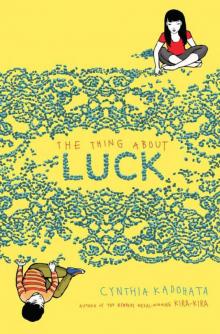- Home
- Cynthia Kadohata
A Million Shades of Gray
A Million Shades of Gray Read online
A Million Shades of Grey
Also by Cynthia Kadohata
Kira-Kira
Weedflower
Cracker!
Outside Beauty
CYNTHIA KADOHATA
A Million Shades of Grey
To Sammy, light of my life
ATHENEUM BOOKS FOR YOUNG READERS • An imprint of Simon & Schuster Children’s Publishing Division • 1230 Avenue of the Americas, New York, New York 10020 www.SimonandSchuster.com • This book is a work of fiction. Any references to historical events, real people, or real locales are used fictitiously. Other names, characters, places, and incidents are products of the author’s imagination, and any resemblance to actual events or locales or persons, living or dead, is entirely coincidental. • Copyright © 2010 by Cynthia Kadohata • All rights reserved, including the right of reproduction in whole or in part in any form. • ATHENEUM BOOKS FOR YOUNG READERS is a registered trademark of Simon & Schuster, Inc. • For information about special discounts for bulk purchases, please contact Simon & Schuster Special Sales at 1-866-506-1949 or [email protected]. • The Simon & Schuster Speakers Bureau can bring authors to your live event. For more information or to book an event, contact the Simon & Schuster Speakers Bureau at 1-866-248-3049 or visit our website at www.simonspeakers.com. • Book design by Mike Rosamilia • The text for this book is set in Berkeley Oldstyle Book. • Manufactured in the United States of America • 1209 MTN • First Edition • 10 9 8 7 6 5 4 3 2 1 • Library of Congress Cataloging-in-Publication Data • Kadohata, Cynthia. • A million shades of gray / Cynthia Kadohata. — 1st ed. • p. cm. • Summary: In 1975 after American troops pull out of Vietnam, a thirteen-year-old boy and his beloved elephant escape into the jungle when the Viet Cong attack his village. • ISBN: 978-1-4169-1883-7 • ISBN: 978-1-4169-9859-4 (eBook) • 1. Vietnam—History—1975—Juvenile fiction. [1. Vietnam—History—1975—Fiction. 2. Elephants—Fiction. 3. Survival—Fiction.] I. Title. • PZ7.K1166Mi 2010 • [Fic]—dc22 2009033307
Chapter One
1973, Central Highlands, South Vietnam
Y’Tin Eban watched Tomas fasten the rope around Lady’s neck. Lady was the smallest of the village’s three elephants, but she was also the strongest, so she was much in demand as a worker. Today Lady would be dragging logs for the Buonya clan. The Buonyas’ house had caught fire and they were building a new one.
Y’Tin stood just in back and to the side of Tomas. Sometimes Tomas got annoyed at how closely Y’Tin stood, but Y’Tin didn’t want to miss anything. On the other hand, Y’Tin didn’t want to annoy Tomas too much or he might refuse to train Y’Tin further. At fourteen Tomas Knul was the youngest elephant handler ever in the village, but Y’Tin hoped to beat that record. Y’Tin was only eleven, but he was confident that he would be a fine elephant handler someday.
“Stand back,” Tomas snapped. “Or I won’t let you work with the elephants today.”
Y’Tin dutifully stepped back. He did whatever Tomas told him to do. There were other kids who hung around the elephants, but Y’Tin was the one Tomas had chosen to train. Tomas had assured him that when the time was right, Y’Tin would become Lady’s handler. Y’Tin didn’t want him to change his mind.
One of the kids who hung around got too close, and Y’Tin snapped, “Stand back,” just as Tomas had snapped to him.
Tomas glanced at Y’Tin. “I was thinking I’d let you ride her into the village today. I’ll walk beside you. Do you think you’re ready?”
“I’m ready,” Y’Tin said. He had been ready for months. He patted Lady’s side; she ignored him.
Tomas looked at him thoughtfully. “I think you want to be an elephant handler even more than I once did.”
“Sure thing,” Y’Tin said in English. He had learned that from one of the American Special Forces soldiers his father knew. The Americans had many words for “yes.” “Sure,” “okay,” “right,” “affirmative,” “absolutely,” “yeah,” “check,” “Roger that,” and “sure do, tennis shoe” came immediately to mind.
Y’Tin walked around to Lady’s trunk to have a talk with her. “I’m going to ride you in today, Lady. You need to behave yourself.”
As if in answer, Lady pushed him to the ground with her trunk. And she didn’t let him up. It was embarrassing. He tried to get away, but Lady was too strong. “Tomas,” he said. “Uh, can you help me?”
Tomas rolled his eyes. “Lady!” he said sharply, and Lady let Y’Tin up. “You’ve got to be firmer with her,” Tomas scolded Y’Tin. “Use your hook to keep her in line.”
“But I want her to like me.”
“You want her to respect you. Now help get those logs attached to her rope.” Y’Tin and one of the Buonya boys tied logs to the end of the rope attached to Lady’s harness. She would haul the logs to the building site.
When the logs were secure, Y’Tin said, “Muk, Lady.” But she refused to kneel. “Muk!” He noticed Tomas looking at him. “Muk!” he said again. Y’Tin could feel his face growing hot. He took his stick with the hook and poked her with it. She still didn’t respond.
“Lady, muk,” Tomas said mildly, and she immediately knelt.
Y’Tin climbed aboard her, his legs straddling her back. “Lady, up,” Y’Tin said, and for once she listened.
“Lady, nao,” Tomas said, and she calmly followed him, dragging the three huge logs behind her.
Y’Tin felt a rush of happiness. When they reached the gate to the village, he sat up with his chest sticking out proudly. Lady followed Tomas to the site where the new longhouse would be built. The Buonyas were one of the biggest clans in the village, so they were planning a house one hundred meters long. That translated to a lot of logs.
And so it went for the rest of the afternoon, with Lady and Y’Tin going back and forth from the jungle to the site. At one point Lady actually knelt when he told her to. It was just about the best day of Y’Tin’s life.
That night as he lay in his family’s room in the clan’s longhouse, the others slept while he stayed up going over and over the whole afternoon. He could see Lady clearly when he closed his eyes. He felt giddy. Everyone kept saying that he was too young to know what his future held, but he knew as well as he knew anything that he would spend his life as an elephant handler. Still, his father had told him to always think about “the other hand.” So, on the other hand, he had been working with Lady for many months now and he didn’t seem to be making much headway with her. Today when she knelt and stood up on command were the first times she had ever listened to him.
Tomas always warned him not to become too friendly with her or she wouldn’t respect him. He liked to remind Y’Tin of the time a few years ago when Lady went into a rage for some mysterious reason. Y’Tin still remembered the huge gap in the fence that she had stampeded.
Y’Tin’s father was sleeping fitfully, mumbling about the Americans. His father had a lot on his mind lately. He worked with the American Special Forces and had been talking to Y’Tin’s mother about the possibility of becoming a Christian. He hadn’t made any decisions about it yet. He often took a long time to make a decision. For instance, it had taken him nearly two years to allow Y’Tin to work with the elephants, and it had taken him a year to decide to work with the Americans.
So far the remoteness of the village had saved it from the worst of what the Americans called the Vietnam War and what his father called the American War. Y’Tin hoped the war would be over by the time he was grown. North and South Vietnam had been fighting since well before Y’Tin was born. The Americans fought with the South.
All his father thought about was the war, and all Y’Tin thought about was elephants. Y’Tin knew he was different from the other boys in that he
did not want to be a farmer. That’s why his parents worried about him so much. There was just one thing that he wanted: to be an elephant handler. Meanwhile, Y’Tin did so poorly in school that his parents were disappointed in him. His older sister, H’Juaih, got highest marks. He was proud of her, but that didn’t mean he wanted to be like her.
“Y’Tin?” his mother called out from the darkness.
“Yes, Ami.”
“I knew you were still awake.”
And, indeed, she often did know when he was awake, though he didn’t make a sound. He never knew whether she was awake or sleeping. Either way, she was silent.
“Are you daydreaming again?”
He didn’t answer.
“If you spent as much time on your homework as you do on your daydreaming, your grades would be the same as H’Juaih’s.”
“Ami, I was just thinking. That’s different from daydreaming.”
“How is it different?” his mother responded.
“Daydreaming is thinking about things that aren’t true yet. Thinking is when you ponder matters that are already true.”
She didn’t answer, and he knew he had won the argument. On the other hand, maybe she just stopped talking because she was tired. He was tired also. He closed his eyes and watched Lady until he fell asleep.
Chapter Two
Before sunup, Y’Tin woke to hear his mother shaking his father awake. “Sergeant Shepard wants to talk to you,” she told him in a low voice.
“What?” Ama said sleepily. Y’Tin heard his father rustling, probably sitting up.
“Sergeant Shepard,” his mother repeated.
Y’Tin sat up too. “Are you going on a mission, Ama?” he asked.
“I don’t know,” his father said. “I’ll find out from Shepard. You go back to sleep.”
Instead, Y’Tin stood up. “Can I come if you go on a mission? Remember when you told me someday I could?”
“I said someday maybe you could.”
“Ama, I could track for you. You know I’m a good tracker.”
“I know. Go back to sleep,” Ama said.
“Go to sleep, Y’Tin,” Ami said.
Y’Tin waited until his father had slipped out of the room and then he followed. At the front porch Y’Tin stood just inside the door watching. Shepard nodded at him and he nodded back. A cigarette hung from Shepard’s mouth, as usual. Y’Tin’s heart speeded up, but not in a bad way. The Americans had announced that they would be leaving Vietnam soon, and this might be Y’Tin’s last chance to go on a mission with his father.
“You got cigarette for me?” Y’Tin’s father asked Shepard in English.
Shepard handed him a cigarette. Y’Tin knew his father thought the cigarettes that his tribe rolled themselves tasted better than the American cigarettes, yet for some reason he enjoyed smoking the American cigarettes more.
His father said “Ahhhh” when he exhaled. He always did that when he started his first cigarette of the day.
“I get cigarette too?” Y’Tin asked in English.
“Your mother told me you don’t smoke,” Shepard said. “She said you’re just a little boy.”
Y’Tin laughed. “I old for my age.”
“How do you figure?”
“Got too many responsibilities. Very stressful.”
“Go on inside, Y’Tin,” his father said. “Go on, boy.” But he didn’t say it angrily or even very seriously. If he had, Y’Tin would have gone back inside.
The men climbed down the notched log that served as a ladder for the longhouse. Y’Tin followed. A couple more Special Forces soldiers were standing just a few meters away with two Rhade tribal members. Shepard, Y’Tin’s father, and Y’Tin joined them. Shepard squatted and put his cigarette out on the ground, then put the filter in a bag in his pocket. This way, he wouldn’t leave a mess on the Rhade ground. The Americans were very considerate.
Shepard turned to Y’Tin’s father. “We got one last thing we need done. Y’Thu, we need you to be our tracker to a former enemy camp. We know loosely where there was a North Vietnamese Army company last week, and we need to see how many soldiers were there. We’re not expecting any contact with the enemy. It’s just a few klicks away, but it’s slow going. Very heavy jungle. You available to spend the night in the field?”
Y’Tin’s father blushed. “I got to talk to my wife first,” he mumbled. “She thought I all finish with this stuff.” Y’Tin knew that since the Americans were leaving in a couple of weeks, his father had been told that he wouldn’t be needed for any more missions.
“I understand. Go on and talk to your wife. Make sure to tell her this mission is supposed to be smooth sailing.”
“What ‘smooth sailing’ mean?” asked Y’Tin. “Easy mission?” Y’Tin turned to his father and spoke in Rhade. “Ama, you ask Ami if I can come too? I promise I’ll do my homework for a week.”
“Why not do your homework forever?” his father asked.
“Forever,” Y’Tin said solemnly, but his father just laughed at him.
His father jogged over to their longhouse and climbed up. His mother was already on the porch, watching them.
Y’Tin turned to Shepard. “It bad luck to go now. You tempting the spirits.”
“Just this last mission. It’s no contact with the enemy,” Shepard assured him.
“I come too?”
“Let’s see what your mother and father say.”
Y’Tin’s father climbed down again. “Okay?” Shepard asked.
“Okay,” Y’Tin’s father said. “You let my son come?”
“Yep, if you want. It’s smooth sailing.”
Y’Tin’s heart fluttered. Riding Lady into the village and now this. What a week!
“All right, we need to get a move on,” Shepard said.
Y’Tin didn’t know what a “move on” was and where they might get one, but he didn’t ask.
Shepard continued. “We got the order an hour ago. We need you—you and your son—to find the camp and estimate how many were there. I don’t know what for, the powers that be just requested the information. And who’s the best tracker I’ve ever worked with?”
“Ah,” Y’Tin’s father said, feigning modesty. Then he seemed to ponder for a moment before saying less modestly, “I guess I pretty good, if I say so myself.”
“We took the liberty of packing for you. Canteen, PIR rations, ammunition. And here’s your rifle.”
“What I need rifle for?”
“Nothing, but if we do need them, we should have them.”
“Gotcha, G.I.”
“Okay, let’s get started. Remember, no contact. You see anything suspicious, you let us know, and we’ll back off. Nobody wants to get hurt this late in the game.”
“Gotcha, G.I.”
Ama patted Y’Tin’s shoulder proudly. Then he looked worried. “We make sacrifice first? My wife suggested.”
“The sun is starting to come up. It’s getting late,” Shepard said.
“Don’t say I no warn you.”
“We won’t.”
They all entered the jungle together. Y’Tin’s senses seemed so alive, he felt almost inhuman. Everyone said he was part elephant, and maybe that was true.
Y’Tin walked by his father’s side. He felt very proud. And he really loved to feel very proud. And he loved walking in front of the other men.
He put his whole being into tracking, just as if he were stalking prey. He walked so quietly that he couldn’t hear himself, and that made him feel proud as well. They moved very slowly for several kilometers. Then Y’Tin saw them: several tracks, crossing their pathway. He noticed before his father did. He dropped to his hands and knees and studied the tracks. Six different soldiers. They made six distinct prints: One walked with his toes pointed slightly in; another had small feet—possibly a woman; one left different tread marks from the others; one came down hard on the heels; another had the second smallest feet; and one made a telltale scuff as he lifted his feet. Y’Tin’
s father squatted down beside him and then nodded in encouragement. “Six soldiers,” Y’Tin said. He stood up and his father followed suit. Then Y’Tin saw the pride in his father’s face as he looked at Y’Tin.
As they followed the tracks, there were times when Y’Tin almost lost the trail. The others kept waiting for him silently—he always took a little longer than his father to figure out what the tracks were telling him. His father had once told him that every trail told a story and the important thing was not to read the story the fastest but, rather, the most accurately. Y’Tin knew that Ama could read faster and more accurately than he could.
The six soldiers had sanitized their tracks very well. But you could never sanitize your trail completely. A broken twig, a bent blade of grass—there would always be a sign of where you were going, of where you’d been. Y’Tin glanced back at Shepard and at Ama’s friend Y’Bier Hlong, who was sanitizing their trail. With about 100,000 members, the Rhade—Y’Tin’s tribe—was one of the biggest Dega tribes in Vietnam, and many of the Rhade worked with the American Special Forces. In Y’Tin’s village, however, there were only a few men who worked with the Americans. Who knew why?
The trail disappeared, but Y’Tin and his father continued in the same direction as before. After about forty meters they picked up the trail again. Y’Tin’s father gestured with his hand, and they turned right, just as the trail did.
Twenty minutes later the trail split in two. Y’Tin studied the split and noticed that nobody had even stopped to talk: One trail of five prints simply went to the right, and the other trail—of just one soldier—went left. He thought about that, knelt, and studied the fork. He looked at his father. One way or another, his father had to make a call. Ama opted to follow the trail of five over the trail of one. That’s what Y’Tin would have chosen as well.
After about an hour Y’Tin realized they’d made a mistake when he saw the trail of five men heading out of the jungle. His father always said you had to tell the truth when you made a mistake, because in life when you told one lie, that always led to two lies, and the two lies led to four, until your whole life became a lie. Y’Tin thought that was an exaggeration, but he got the point.

 Weedflower
Weedflower The Thing About Luck
The Thing About Luck Cracker!: The Best Dog in Vietnam
Cracker!: The Best Dog in Vietnam Outside Beauty
Outside Beauty The Glass Mountains
The Glass Mountains Kira-Kira
Kira-Kira Checked
Checked A Place to Belong
A Place to Belong A Million Shades of Gray
A Million Shades of Gray Half a World Away
Half a World Away